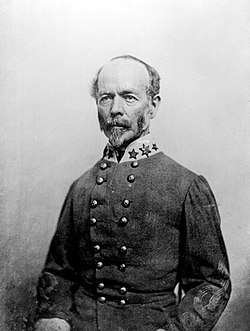Army of the South
| Army of the South | |
|---|---|

Joseph E. Johnston
|
|
| Active | February 1865 to April 10, 1865 |
| Country |
|
| Branch |
|
| Type | Army |
| Role | Confederate army in Eastern Theater |
| Engagements | Battle of Bentonville |
| Commanders | |
| Notable commanders |
Joseph E. Johnston |
The Army of the South was a Confederate field army during the final months of the American Civil War. Formed from a collection of Confederate commands during the Carolinas Campaign, it was engaged in only one major battle, the Battle of Bentonville in March 1865. During the following month, it was reorganized under the name of the Army of Tennessee.
In February 1865, Union armies commanded by William T. Sherman were advancing northward through the Carolinas towards Virginia. They were opposed by troops from the Department of South Carolina, Georgia, and Florida, commanded by William J. Hardee, and cavalry commanded by Wade Hampton; both were under General P. G. T. Beauregard, commander of the Confederate Military Division of the West. However, both Confederate President Jefferson Davis and general-in-chief Robert E. Lee questioned Beauregard's ability to handle the situation in the Carolinas, so on February 23 Lee appointed General Joseph E. Johnston to command the Confederate forces in the Carolinas.
Johnston established his headquarters at Smithfield, North Carolina and named his force the "Army of the South". It consisted of four separate field forces present in North Carolina:
Johnston had a total of less than 25,000 men, with at least 1,300 men without rifles and with a shortage of artillery and wagons.
Johnston initially hoped to concentrate his forces at Fayetesville, North Carolina and attack part of Sherman's forces while it was crossing the Cape Fear River. But Sherman moved more rapidly than Johnston anticipated and another Union force was advancing from Wilmington to Goldsboro, which was on Johnston's flank. Johnston decided that remaining at Fayetesville was too risky, so he retreated back to Smithfield to concentrate his army. Meanwhile, he continued to look for an opportunity to attack an isolated portion of the Union force, hoping to overwhelm that part before the rest of Sherman's force could reach it.
...
Wikipedia
